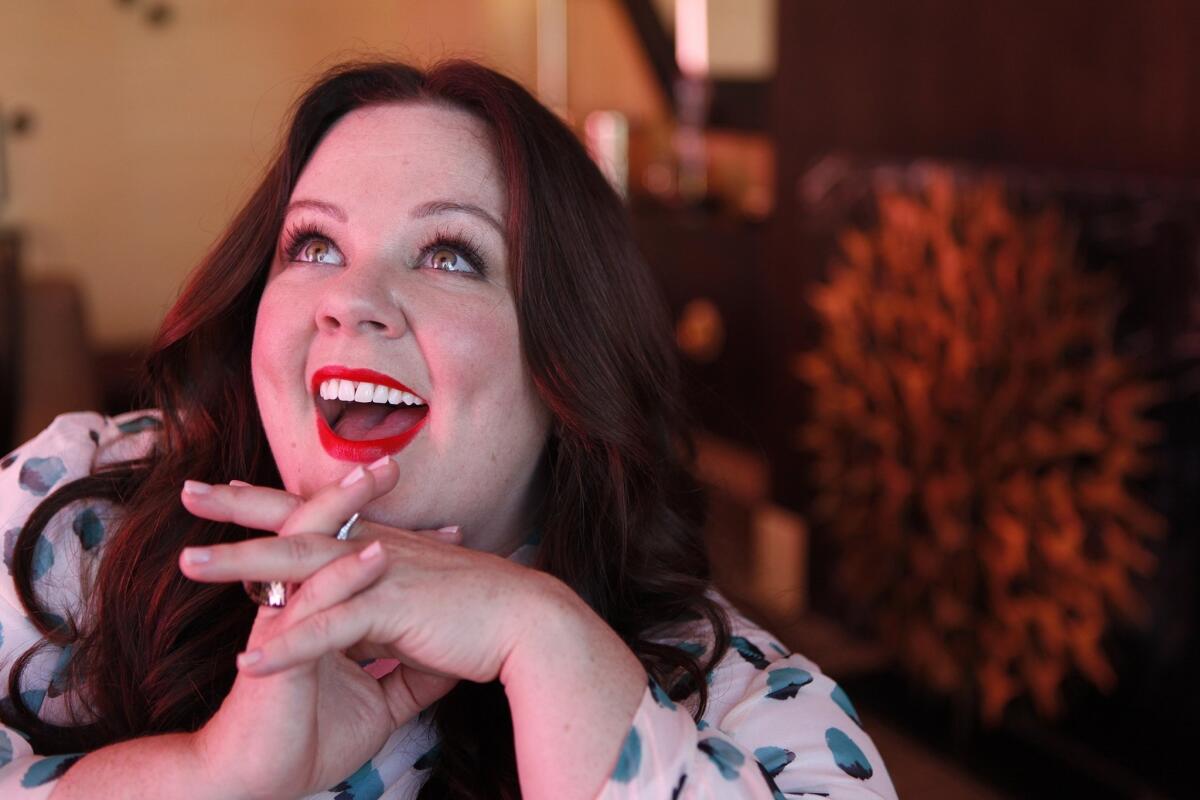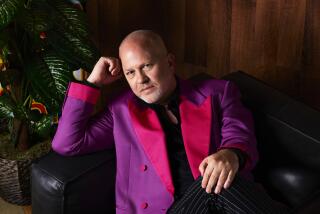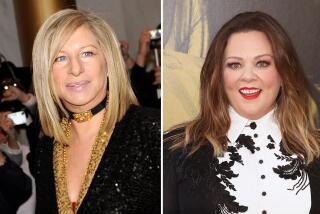Commentary: All hail Melissa McCarthy, Hollywood’s indestructible comic superwoman

It is a good time to be Melissa McCarthy. McCarthy was nominated for supporting actress for her performance in “Bridesmaids” two years ago, won an Emmy for her TV series “Mike & Molly,” was second to Jennifer Lawrence in a recent poll of best-liked actresses, and she has just launched “Tammy,” which she co-wrote with her husband, Ben Falcone, who also directed. To top it off, her last five movies have grossed $650 million. “No other star in Hollywood,” waxed Vulture.com, “delivers as consistently, and in such great numbers, and with so little assistance as Melissa McCarthy.”
She may be Hollywood’s biggest female star. She may also be its most important.
Of course, her popularity begins with the fact that she is hilarious — one of the great female comedians, in my estimation, of all time. Think of her in “Bridesmaids” at the tony wedding salon, dressed like a bus driver, either belching or breaking wind and then declaiming, “I won’t apologize. I’m not even confident of which end it came out of.” Or in “Identity Thief” driving Jason Bateman bonkers by shimmying and singing along to “Milkshake,” “I’m Gonna Be (500 Miles)” and “Barracuda” on the car radio. Or in “The Heat” providing a loud running commentary on her search for her captain’s testicles since she thinks he is insufficiently ballsy. Or in “Tammy,” robbing a burger joint with a paper bag over her head and pointing her finger as a weapon. Or just think of her running, her legs churning like a cartoon character’s.
But if McCarthy’s popularity begins with funny, it doesn’t end there, which is why she is important. She is also one of the most unconventional stars in the history of movies and perhaps the most revolutionary since Barbra Streisand. McCarthy has that same ability as Streisand to connect with audiences not as a vicarious vessel of who we would love to be if our genes had been better but as our screen representative of who we really are — albeit with a heavier dose of self-confidence. Like Streisand, McCarthy is an admixture of poignancy and power, nowhere more evident than in “Tammy” where these traits keep alternating from scene to scene. She is a working-class hero who refuses to accept her victimization.
That is a rupture with the past. We have had actresses who were witty (Jean Arthur or Irene Dunne) and some who were tough and hard-boiled (Bette Davis or Joan Crawford), but their appeal was still fundamentally a function of beauty or charm or allure, including female comedians like Cameron Diaz, Kristen Wiig and Tina Fey, all of whom are conventionally attractive and “feminine.” They were basically love objects waiting to be melted by the right man. McCarthy’s appeal is based on something very different. Hers is based on not taking crap from anyone.
Streisand was the first one who changed the architecture of stardom. She waded into the flock of Hollywood swans, a seeming ugly duckling, and wound up besting all of them. Streisand didn’t have conventional beauty; she was often called “exotic.” But she had all sorts of qualities that compensated: among them, moxie, abundant talent and that poignancy to which audiences, especially women, could relate. As Streisand herself once astutely observed, she was the girl who didn’t get asked to the prom, though if she had, she probably wouldn’t have become a star.
More than any other star, Streisand demonstrated that beauty was more than skin deep; it was soul deep. But “beauty” was still the operative word. Her magic was that she transformed herself into a credible romantic lead — at first through the superiority of her character and later physically. It has taken a generation, which shows how unusual these sorts of actresses are, but McCarthy may be the next milestone in the evolution of women on screen.
Though she is pretty enough, her appeal isn’t about beauty, not even inner beauty. And though her characters are confidently lusty — “I’m like a Cheeto,” she says in “Tammy.” “You can’t eat just one” — she is not likely to be the romantic lead. Her characters haven’t learned, nor do they seem to care, about winning a man’s heart, and while she does have a love interest in “Tammy,” I suspect we won’t see her, as we would see Streisand, becoming a glamorpuss.
Part of that, of course, is a function of McCarthy’s weight. To call her a “big” star is to invite insult, and McCarthy has certainly been a target. Elle magazine caused a kerfuffle when it featured her on its cover last year in an oversized coat that seemed designed to hide her weight, and New York Observer critic Rex Reed ranted in his review of “Identity Thief” that she was “tractor-sized” and a “female hippo” who basically got her laughs from her obesity. The comments were needlessly cruel, but they were also critically obtuse. Would he have said the same thing about Fatty Arbuckle or W.C. Fields or Oliver Hardy or John Candy?
McCarthy’s weight is part of her physical equipment, no different than her bright, dancing green eyes or her cherubic face with the deep, deep dimples. There are plenty of overweight people. There is only one Melissa McCarthy.
And Reed is obtuse in another, more significant way. He didn’t understand that McCarthy’s size is as metaphoric as Streisand’s nose, which was also derided by critics. Her weight is one of those things that distinguishes her from every other star and that pulls her into our consciousness. It is a reason that audiences identify so closely with her. It is one reason that “Mike & Molly” is such a solid performer. In fact, if there is any problem with McCarthy’s weight it is that it is tempting to use it not for laughs but for sentimentality, which almost prevented her from becoming a star.
In her television roles on “Gilmore Girls,” as the protagonist’s best friend, and on the short-lived series “Samantha Who?” and even on the first two seasons of “Mike and Molly,” before they figured out how to tap her inner wildness this year, McCarthy has been a soft presence — likable but not the comic genius she is in her movies.
But in “Bridesmaids,” McCarthy devised a persona that is anything but soft or sentimental. From that film through “Tammy” she has been raw, uninhibited, vulgar — and oblivious to anything that threatens to take her down. She is indestructible. Not incidentally, these are qualities that are in vogue today. No star develops characters as self-contained as McCarthy’s or who live as fully within their own bizarre reality. They are semi-solipsists. McCarthy’s characters have no social graces or even social skills. Often they spout non sequiturs. But no one gets the better of them. And this is where the metaphor of her weight really kicks in: Melissa McCarthy is big so that she can throw her weight around.
That is the primary source of her comedy and, I think, of her appeal, which goes beyond her comedy. She will not allow herself to be condescended to, and she doesn’t suffer anyone, not just fools, lightly. She is a bull in the cosmic china shop. With her, you don’t feel, as you did even with Streisand, that it is just a matter of time before the world discovers her inner beauty and succumbs. With her, you know the world will never accept her and that the only way to deal with it is to slap it silly. One critic called her “dangerous,” and that is exactly what she is. She will do or say anything. In effect, she is the great cinematic equalizer.
This has given her a large following among women and gays, groups that understand what it means to have to fight for empowerment, and like their protests, McCarthy’s persona is a reaction against humiliation. The “reveal” in her movies is that her characters, invariably working-class, have suffered and that becoming a human bulldozer is how she has learned to deal with it.
Megan in “Bridesmaids” rallies Wiig’s character back from despondency by describing her own high school years when classmates threw firecrackers at her head: “And I mean that literally, not figuratively,” she says. Diana in “Identity Thief” was a foundling who doesn’t even know her real name. Shannon in “The Heat” is the outcast in an insular Irish family. And Tammy, with stringy, dirty blond hair and a Goodwill wardrobe, loses her car, her job and her husband in short order, making her pathos for once not the reveal but the engine for the antics that follow.
So when we laugh in a McCarthy movie, we are not laughing at her nor are we even laughing with her. We are laughing for her — for all the indignities her characters have endured and their obdurateness in the face of them — and we are laughing for ourselves and our own hopes of indestructibility. Oversized, self-absorbed, impervious to insult or pain, Melissa McCarthy is our comic superwoman.
More to Read
Only good movies
Get the Indie Focus newsletter, Mark Olsen's weekly guide to the world of cinema.
You may occasionally receive promotional content from the Los Angeles Times.






